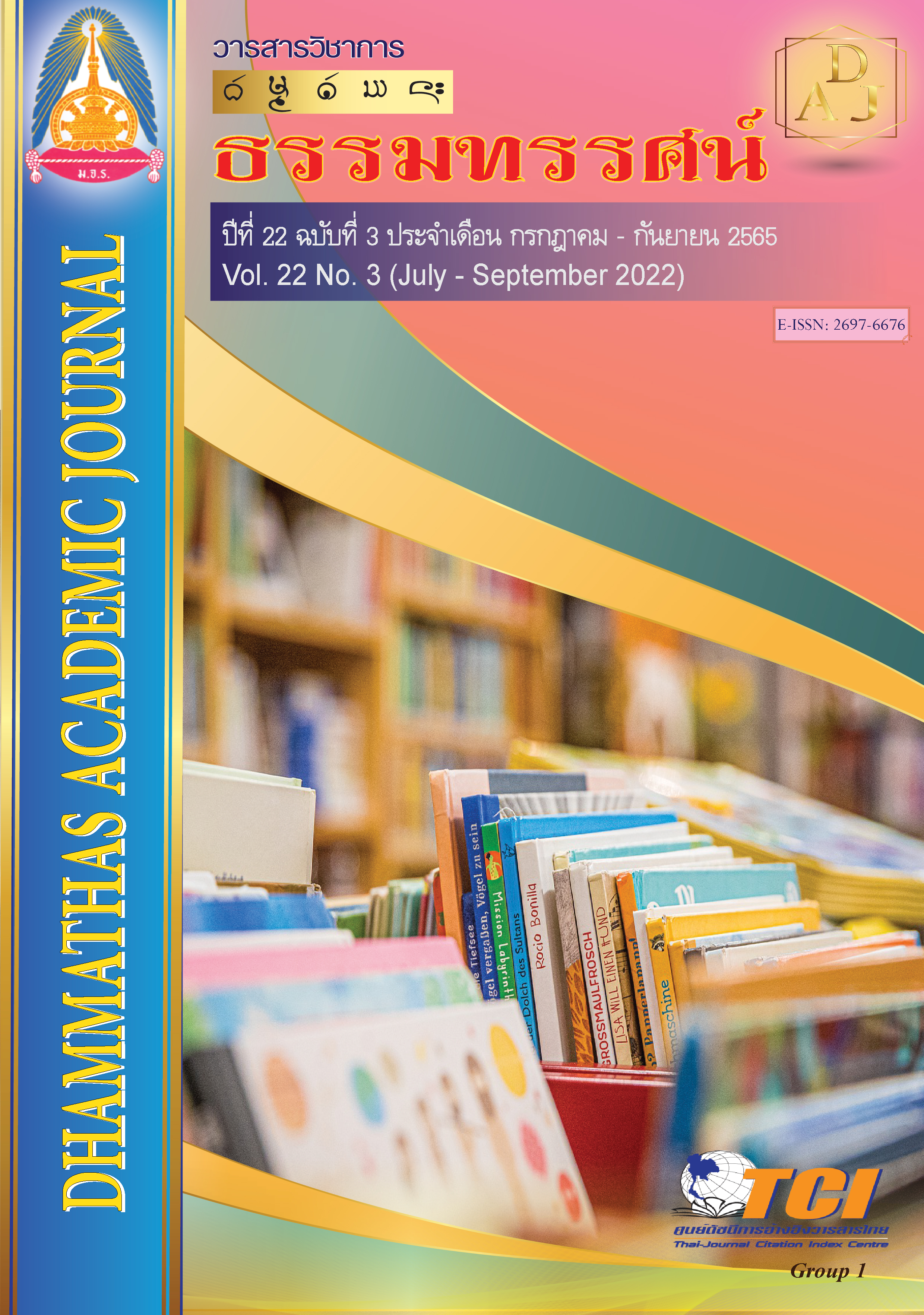The Application of the Buddhamma Principle and the Sufficiency Economy Philosophy for the People’s Cohabitation in Na Udom village, Nikhom Huai Phueng Sub district, Huai Phueng District, Kalasin Province
Main Article Content
Abstract
The objectives of the research were: 1) to study the level of application of Buddhist principles in the sufficiency economy philosophy in Na Udom villages, Nikhom Huai Phueng Subdistrict, Huai Phueng District, Kalasin Province, 2) to compare the application of Buddhist principles in the philosophy of sufficiency economy with Na Udom villages classified by personal factors. This was quantitative research. The population consisted of 376 Na Udom villagers. The samples were obtained using the Taro Yamane formula. The samples were 194 people. The instruments used in the research were questionnaires, data analyzed using the SPSS program, the statistics used were percentage, mean, standard deviation, independent sample t-test, and one-way analysis of variance: ANOVA.
The results showed that:
1. Applying Buddhist principles in the sufficiency economy philosophy to Na Udom Village Overall, it was at the highest level ( = 4.38, S.D. = 0.35) and in each aspect in descending order as follows: lifestyle, Dharma practice, Buddhist culture, and traditional beliefs, traditions, and rituals, respectively.
2. The results of the comparison of opinion levels in living according to the sufficiency economy philosophy with different status in terms of sex education levels, age and occupation were found to differ significantly at .05 level. As for the average monthly income was found that there was no statistically significant difference at the .05 level.
Article Details

This work is licensed under a Creative Commons Attribution-NonCommercial-NoDerivatives 4.0 International License.
เพื่อให้เป็นไปตามกฎหมายลิขสิทธิ์ ผู้นิพนธ์ทุกท่านต้องลงลายมือชื่อในแบบฟอร์มใบมอบลิขสิทธิ์บทความ ให้แก่วารสารฯ พร้อมกับบทความต้นฉบับที่ได้แก้ไขครั้งสุดท้าย นอกจากนี้ ผู้นิพนธ์ทุกท่านต้องยืนยันว่าบทความ ต้นฉบับที่ส่งมาตีพิมพ์นั้น ได้ส่งมาตีพิมพ์เฉพาะในวารสาร วิชาการธรรม ทรรศน์ เพียงแห่งเดียวเท่านั้น หากมีการใช้ ภาพหรือตารางของผู้นิพนธ์อื่นที่ปรากฏในสิ่งตีพิมพ์อื่นมาแล้ว ผู้นิพนธ์ต้องขออนุญาตเจ้าของลิขสิทธิ์ก่อน พร้อมทั้ง แสดงหนังสือที่ได้รับการยินยอมต่อบรรณาธิการ ก่อนที่บทความจะได้รับการตีพิมพ์References
จรูญ รัตนกาล. (2556). การประยุกต์หลักพุทธธรรมและแนวคิดเศรษฐกิจพอเพียงเพื่อการอยู่ร่วมกันของประชาชนในพื้นที่ตำบลสามบัณฑิต อำเภออุทัย จังหวัดพระนครศรีอยุธยา. (รายงานการวิจัย). พระนครศรีอยุธยา: กองทุนสนับสนุนการวิจัย มหาวิทยาลัยราชภัฎพระนครศรีอยุธยา.
ธานินทร์ ศิลป์จารุ. (2563). การวิจัยและวิเคราะห์ข้อมูลทางสถิติด้วย SPSS และ AMOS. (พิมพ์ครั้งที่ 18). กรุงเทพฯ: บิสซิเนสอาร์แอนด์ดี.
พระขรรค์ชัย สุวทฺโฒ. (2562). หลักปรัชญาของเศรษฐกิจพอเพียงตามแนวพุทธกับการพัฒนาองค์การ. วารสารปรัชญาปริทรรศน์, 24(2), 32-43.
องค์การบริหารส่วนตำบลนิคมห้วยผึ้ง อำเภอห้วยผึ้ง จังหวัดกาฬสินธุ์ (2565). ข้อมูลพื้นฐาน. เข้าถึงได้จาก www.nikhomhuaiphung.go.th
อภินันท์ จันตะนี และชมพูนุช ช้างเจริญ. (2563). พระพุทธศาสนากับปรัชญาเศรษฐกิจพอเพียง. วารสารวิทยาการจัดการปริทัศน์, 22(2), 241-250.

